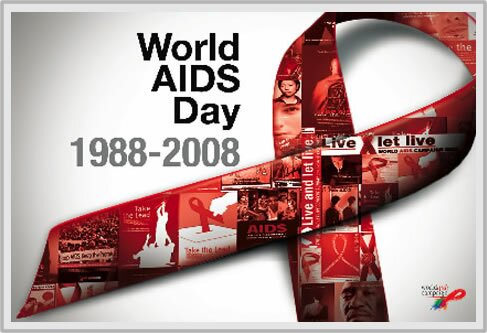Today is World AIDS Day
 Today is World AIDS Day…a day to raise money, increase awareness, fight prejudice, and inspire people to work to improve AIDS education. The day was started in 1988 to remind people that HIV has not gone away, and that there is still much to be done in fighting this disease.
Today is World AIDS Day…a day to raise money, increase awareness, fight prejudice, and inspire people to work to improve AIDS education. The day was started in 1988 to remind people that HIV has not gone away, and that there is still much to be done in fighting this disease.
Think AIDS doesn’t affect you? Think again. According to the CDC (Center for Disease Control), 25% of all new cases of HIV in the U.S. are now occurring among teens, ages 13 to 19 (CDC). A majority of teens have begun sex by 16. Yet too many teenagers do not believe they are vulnerable to HIV/AIDS. Concerned friends can help save their young friends from making errors in judgment that could negatively impact their lives.
In honor of World AIDS Day, I’m reprinting information I found on the Metro TeenAIDS website – a community health organization dedicated to supporting young people in the fight against HIV/AIDS, including tips for practicing safe sex that can help protect you.
People who have HIV don’t look or act any differently from uninfected people. They may even seem very healthy. HIV usually takes several years to cause AIDS, so HIV carriers may not know they have it. You get HIV by exchanging body fluids with someone who’s already infected. This means you can get HIV by:
- having sex with an infected partner (male, female or transgender)
- sharing needles (for tattooing, piercing, or drugs) with an infected person
HIV doesn’t care who you’re having sex with or who you’re sharing needles with. Once HIV is in your bloodstream, that’s it — you’re infected also. AIDS is a result of being infected with HIV. AIDS is a disease which destroys your body’s immune system. This means that people with AIDS can’t fight off illnesses. The sorts of things that aren’t a big deal to healthy people, like the common cold, are very dangerous to AIDS patients.
Here are some safe sex practices: starting with the ones that will keep you the safest!
- Don’t have sex. Abstaining from sex is the best way to keep yourself free from HIV and other sexually transmitted diseases.
- If you haven’t had sex yet, consider waiting until you are in a committed relationship with the same person for more than 6 months. Then if you feel ready to have sex, both of you can go get tested for HIV and other sexually transmitted diseases.
- If you’re already sexually active, using a latex condom every time during sex can protect you from getting HIV and other STDs.
For more information about HIV/AIDS, check out these websites:



